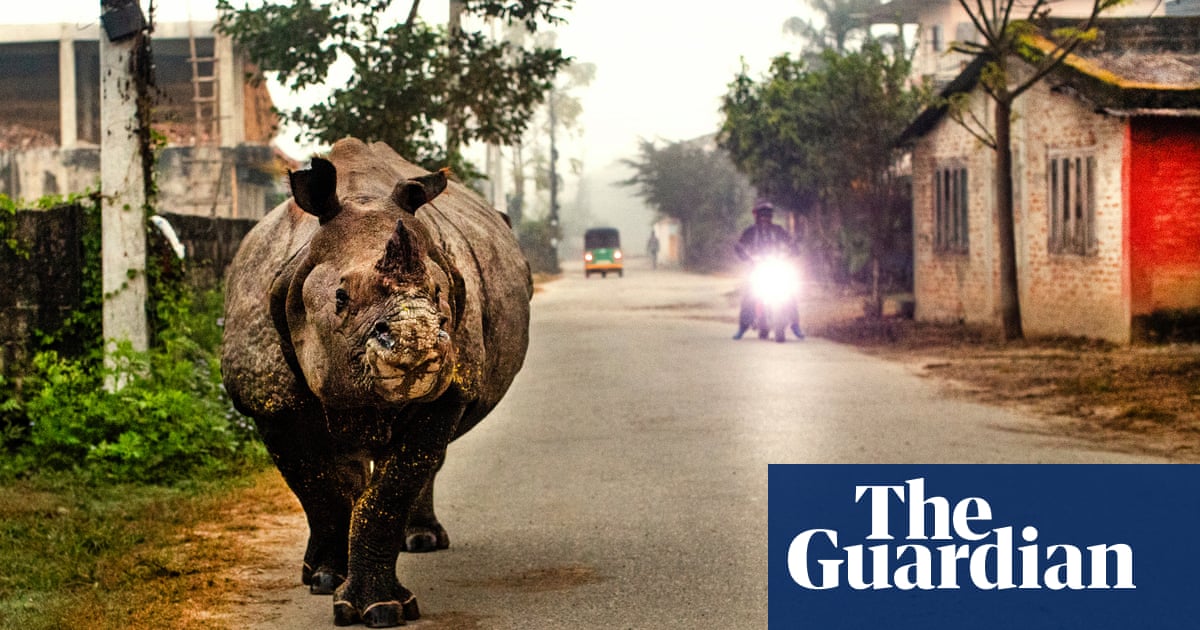Sergei and Marina escaped Russia three years ago under threat of arrest after protesting against the Ukraine war, seeking asylum in the US. Now their best chance of remaining together, as a family, is to flee again.
In a whirlwind three weeks, the couple’s plans to rebuild their lives in the US were abruptly upended.
On 27 March, Immigrations and Customs Enforcement (Ice) called Sergei into the agency’s San Francisco office for a seemingly routine administrative appointment – and arrested him. They transferred him to a detention center 250 miles away from his family, and cut off his asylum claim. He could reapply, but he’d have to remain in detention indefinitely, and risk being deported to a country that has brutally cracked down on anti-war protesters.
So Sergei and Marina are asking the US government to let them leave, along with their two-year-old daughter, on their own terms.
“It’s kind of crazy, because we have to start life from point zero once again,” she said. “But it’s much better than being separated, or worse.”
Since leaving Russia in 2022, Sergei and Marina had adhered to every requirement in the US’s labyrinthine immigration process. (The Guardian is not printing their full names to protect them from potential reprisals in the US immigration system, and in Russia.)
When they first arrived at the US-Mexico border, they made an appointment with immigration officials, and they had explained how Marina – who was pregnant at the time – had been arrested and fined for speaking out against Russia’s invasion of Ukraine. They explained that she feared she would be arrested again, and detained in brutal conditions. Sergei could face a draft, and be forced to either fight in a war he didn’t support, or serve a prison sentence.
They had been waiting ever since for an immigration judge to hear their case. When Ice summoned Sergei, the couple thought it was strange, but figured they’d need to sign some more documents – they never expected arrest.
“I left home so that I wouldn’t be afraid to be put into prison again,” said Marina. “When I came here, I thought, worst case they can refuse us asylum. But I didn’t expect that something like this could happen. Not again.”
Ice asked Marina to come back and check in again, as well – and she has been terrified she will be arrested too, and separated from her daughter, who is a US citizen. “If both the parents are in prison, will they put my daughter in a foster family?” she asked
Thatis why the couple decided that their best option would be to leave. They asked their lawyer to petition the government to release Sergei, so he, Marina and their daughter could depart the US and head to Serbia.
They would be leaving behind many friends, including ones who had become like family, in California. “But I don’t want us to keep struggling here,” she said. “I came here for a normal life. I wasn’t ready to keep struggling.”
More than 8,300 Russian nationals have applied for asylum in the US since Russia invaded Ukraine, according to homeland security (DHS) data aggregated by the Transactional Records Clearing House (Trac), a group that tracks immigration data. About 85% of Russians who applied for asylum were granted it in 2024, according to Trac. But immigrant advocates and lawyers have said that since mid-2024, asylum seekers from Russia and other post-Soviet counties are increasingly being detained while their cases are in process.
And since the Trump administration took office, lawyers and advocates said they have also noticed a larger trend where immigrants with pending cases and appeals or parole, who were complying with requirements to check in with immigration officials, are increasingly being detained.

In an analysis of arrest data from the first four weeks of the Trump administration, the Guardian approximated that about 1,400 arrests, or about 8% of the nearly 16,500 arrests in the administration’s first month, may have occurred during or right after people checked in with the agency. Such arrests happened during the Biden administration as well – on average per month in 2024, about 821 arrests occurred potentially during or right after check-ins.
But Ice under Biden had been instructed to focus on arresting and detaining people with criminal histories, who might pose a threat to public safety. Even when immigration officers issued citations, they used their discretion to release immigrants on supervision. The Trump administration, meanwhile, has broadened Ice’s priorities to target anyone who is in the US without a permanent legal status.
When Ice detained Sergei, an immigration official told him he had missed a summons the agency mailed to an old address last year. But Ice would not provide his lawyer a copy of that document. Besides, the couple had notified the Executive Office for Immigration Review each time they changed addresses.
The DHS does not usually comment on individual immigration cases.
“We have never broken any rules,” Marina said. “It’s easier to take someone who doesn’t break any rules. If you ask him to come, he will – and you can just take him.”
****
Marina has told her two-year-old that her dad is on a little trip, that they’ll all be together soon. But the toddler has noticed her mother’s distress, Marina said. “She’s even been patting my head, trying to comfort me.”
For Marina, the fear and uncertainty feel familiar. “Actually, the fear I feel here is nothing compared to what I experienced back in Russia,” she said.
The couple had departed Russia in a frenzy.
Marina had been working as a photographer for stock photo agencies – but in her free time, she began documenting her adventures in keeping and breeding pet frogs, collecting a sizable following on her personal blog, as well as Instagram and YouTube. Sergei had been gaining quite a reputation as well, working with auto bloggers and influencers to build tricked-out, bespoke cars.
When Russia invaded Ukraine in 2022, Marina decided to leverage some of her social media influence to advocate against the war. “My blog was about animals, not politics, but it didn’t matter,” she said. “I wanted to speak out.”
Then, the Russian government began enacting war censorship laws, banning public protests and imposing stiff sentences on journalists who called the military operations in Ukraine a “war” or an “invasion”. Marina tried to get more creative with her advocacy, but she was apprehended for holding flyers with anti-war messages. “I hadn’t even posted them up,” she said. “But the judge wasn’t interested in hearing it.”
Not long afterwards, she realized she was pregnant. “It was so crazy – I was 34 and this was my first pregnancy. I had really wanted to have babies,” she said. But authorities had repeatedly warned her that if she was arrested again, she would face prison time. Loyalists in her parents’ neighborhood had threatened to report her. “We had to flee as soon as possible.”
The couple flew to Mexico, and landed in Reynosa – across the border from McAllen, Texas – and from there secured an appointment for an interview with immigration officials, and later registered their application for asylum. “We didn’t break any rules, and we didn’t have any problems,” she said.
A few months later, she gave birth to her baby daughter. They had moved to California because they knew some friends there, and Sergei found good work at an auto shop. Marina, meanwhile, began rebuilding her photography business – pivoting from animal photography to family portraits.
She started volunteering at the San Francisco zoo’s frog conservation program, and began keeping and breeding hundreds of frogs of her own, once again. The family found a nanny they love, who’s teaching their now two-year-old daughter little bits of Mandarin. “California really became home for us,” she said.
But they had to quickly accept that if they wanted to remain together, as a family, they will have to leave it all behind.

“Given everything that’s happened, we’ve stopped being upset that America sees people like us as undesirable,” she said. “All we want is to be together again.”
Within days of Sergei’s arrest, the couple began debating – over static-y phone calls Sergei made from the detention center – what they could do. Their lawyer explained that Ice was unlikely to release him, and that the family could remain separated for months while Sergei submitted a fresh asylum claim and waited for his case to be heard in a deeply backlogged asylum system.
The detention center in McFarland, California, in the state’s rural central valley, where Sergei is now wasn’t that bad, he said. Everyone there was, like him, an asylum seeker or immigrant, hoping for a chance to remain in the US. But Marina was terrified he could be transferred elsewhere – to one of the more notorious detention facilities that had been in the news.
And the couple’s biggest fear was that Sergei would be deported to Russia. He has already received summons to serve in the military – and even if he tries to evade the draft, he thinks he’ll be banned from leaving the country. Marina cannot return; she fears she is likely to be imprisoned immediately if she does.
Two and a half weeks after Sergei’s arrest, the couple decided that Serbia was their best option. Russian nationals have been able to get work visas there quite easily – and tens of thousands have registered for temporary residence in Serbia since the war started.
Over the weekend, Marina began looking at flights, and at options on how to end the family’s apartment lease. She’s been considering who might want to adopt the more than 300 frogs she has been keeping, and wondering how she’ll sell the couch.
“I am crying all the time,” Marina said. “And I am making lists of everything I have to do.”

.png) 6 days ago
12
6 days ago
12













































